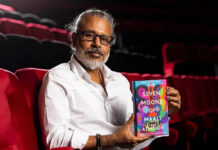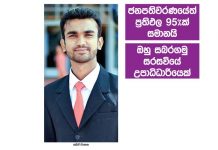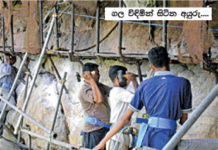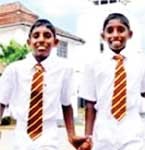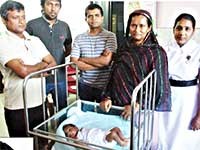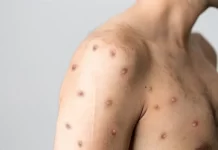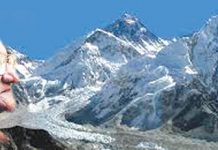It is heartening to note that the GMOA, instead of promoting strikes, expressing expert opinions. However, it should be noted that their expertise is in trade union activities though individual members may be experts in the fields relevant to the epidemic. But the fact that Sri Lanka does not lack expertise, was well demonstrated at a webinar broadcast by the Ceylon College of Physicians. It was with a sense of pride that I watched it, as two of the participants had their compulsory period of foreign post-graduate training, with me in Grantham Hospital.
By Dr Upul Wijayawardhana
Whilst the Coronavirus causing the COVID-19 pandemic is continuing to wreak havoc around the globe, infecting over 2.4 million people and killing about 168,000 at the time of writing, we have witnessed another minor epidemic: the proliferation of experts. By the time this is printed much more would have been infected and, sadly, many more would have died. Also, many more differing experts’ opinions would have been expressed. These would be spread through social media at a speed faster than the virus spread itself!
When so little is known about a tiny organism that is fast spreading, debilitating and killing many, stressing the health care systems around the world like never before and likely to bring about the worst world-wide economic crisis in our life-time, it is no surprise that many want to express their opinions but what is concerning is the so-called expert opinions expressed by some who sadly lack any expertise, at all. They may be experts in different fields but that does not entitle them to express opinions on issues they have no expertise in. Differing opinions may be good for the media, as these make good headlines, but for the general public it causes confusion, at a time when what is badly needed is clarity.
What is known about the virus is very little compared to what we do not know. We know it is a highly contagious virus but still do not fully know how it spreads. This has led to conflicting advice on prevention, the most important being the issue of face masks. Though the WHO has still not recommended general use, many countries including Sri Lanka has adopted this strategy. However, in UK, where I am in partial ‘house-arrest’ at the moment, it is not recommended, huge emphasis being placed on social-distancing. It is widely accepted that wearing a face mask prevents the spread to others, if the wearer is affected. It is also well-known that a badly worn mask may promote infection. If one touches the mask with viruses settled on it and then touches eyes or lips, which we often do involuntarily, the virus would thank you and infect you!
At the early stages of the epidemic, it was hilarious to see a politico in the South removing his mask and giving it to one of his supporters to wear. That incident illustrated how much more health education is needed, even though one has to admit that some politicians are not the easiest to educate.
Another important gap in our knowledge is whether this infection provides immunity though much was talked about the development of ‘herd-immunity’ as a means of control. Though most viral infections impart immunity, some do not, Dengue virus being a good example. The complex immune response to the Dengue virus seems to be one of the reasons why an effective vaccine has not been developed so far. That it does not affect the developed West, may be another reason.
Fortunately, there is a glimmer of hope that a vaccine against COVID-19 is a possibility. Scientist from Oxford University have developed a vaccine and are looking for 5,000 volunteers to test the vaccine. Even if the studies show success, there being no guarantee, the earliest it could be available for general use will be around September. Therefore, it is extremely unlikely to be of any help during this wave of the infection.
The fear most countries have is that, even if they control this wave, a second wave is likely to occur, being the nature of a pandemic. Vaccinations and drug treatments are more likely to be helpful in the future. Number of trials of drugs, including Chloroquine and Hydroxy-chloroquine, much touted by the likes of ‘Dr Trump’ and ‘Dr Premadasa’, are in progress at the moment.
At present, we seem helpless in spite of the bragging by some politicians. Expert-in-everything, Donald Trump got it so badly or maybe, he is just playing to his electorate, but the nett result is that the epicentre of the epidemic has now moved to USA. At the last count, there were over 739,000 affected with more than 39,000 deaths. He likes to blame everyone else and has decided to suspend contributions to the WHO. I can well understand, had he decided to take this step once the epidemic is on the wane and had reasons to believe that the WHO failed in its’ duty but to do so at the height of the epidemic, is plain stupid.
As most of us have the luxury of free time and most media are free, we are inundated with videoclips posted by many experts. Some expound new theories; others promote various types of medication whilst yet others demonstrate new inventions. On many an occasion, I had to point out to the well-meaning friends and relations, who forward these, that the correct procedure for those who suggest new treatments etc. is for them to discuss with their colleagues and put them to test, on agreed scientific methodology, than attempting to get their five-minutes of fame!
We can be proud, at least be relieved, that Sri Lanka has done so well in tackling this epidemic. There will always be critics; on one hand will say things were done too late and on the other hand will say measures are draconian. What matters is that a less-affluent country like Sri Lanka is offering much more than rich countries like UK and USA are offering to their citizenry. To his credit, President Gotabhaya Rajapaksa seems to be soliciting advice from real experts and implementing them in the most practical and forceful way.
Of course, the real experts are busy with their work and probably cannot find the time to be on the media. Meanwhile, other ‘experts’ are aplenty, expressing differing views, as they have plenty of time at their disposal and have good contacts with the media. I was amazed when there was a report, before the epidemic started in Sri Lanka, claiming that the Ayurvedic Research Institute had developed a drug for treating COVID-19 but they were facing a problem as they had no patients to test it on! To my knowledge, Ayurveda is a system that predates infective theories and is best left to deal with what it was meant for.
Interestingly, even non-Ayurvedic physicians seem advocating Ayurvedic cures. I saw one extolling the virtues of coriander, stating that research proof is available. The only research I could find, after an extensive search, is that coriander oil may have anti-bacterial properties. I love coriander for cooking and the leaves are delicious too. Perhaps, there is no harm, maybe even some good in drinking coriander water, but to promote that during an epidemic of this magnitude is like prescribing a loin-cloth for cholera! Then there was a consensus statement from five experts about inhalations. Wonder what clinical trials were carried out by these experts before they reached such consensus!
It is heartening to note that the GMOA, instead of promoting strikes, expressing expert opinions. However, it should be noted that their expertise is in trade union activities though individual members may be experts in the fields relevant to the epidemic. But the fact that Sri Lanka does not lack expertise, was well demonstrated at a webinar broadcast by the Ceylon College of Physicians. It was with a sense of pride that I watched it, as two of the participants had their compulsory period of foreign post-graduate training, with me in Grantham Hospital.
Dr Ananda Wijewickrema impressed me with his meticulous attention to detail and tremendous organising capabilities. On completion of training, he opted to work in IDH and is the Senior Physician now, having developed the hospital to what it is today. His contribution to medicine has been recognised by his election as the President of the Ceylon College of Physicians. Dr Damayanthi Idampitiya, tiny in stature but mighty in strength of character, impressed me during her period of training by her dedication and keenness to return to Sri Lanka, as soon as possible, to serve the people. She too is a Physician in IDH, fighting COVID-19. The low death rates in Sri Lanka is to their credit and to their colleagues in IDH.
We are fortunate to have experts in the Department of Health ably led by Dr Anil Jasinghe, the Director General, and the Epidemiology Unit too, giving proper advice to the President and his Government and it is to the Government’s credit that proper plans have been implemented, utilising all public servants right down to Grama Niladharis, Police and the three services led by Lieutenant General Shavendra Silva. Making Sri Lanka one of the top ten countries in tackling this epidemic and being in the top of the league for developing countries, is no mean task and all these deserve our greatest respect and gratitude.
It is true that all this comes at a cost. We cannot underestimate the suffering of the less-affluent in the country, in spite of the government sponsored relief measures, and do hope normalcy would return soon. They suffer but know it is for a reason. I was moved to tears by the actions of a poor grand-mother, who personified the best of our Motherland. When the local Buddhist priest brought supplies to her, she requested to be given less than what was packed. Not only that, she insisted on payment which I am sure she could hardly afford. In spite of the refusals, she took 200 Rupees out of the knot in her cloth and insisted that her contribution be taken. To please her, the Bhikkhu and retinue accepted 100 Rupees from her. She demonstrated true expertise in human kindness and concern.
The Island

